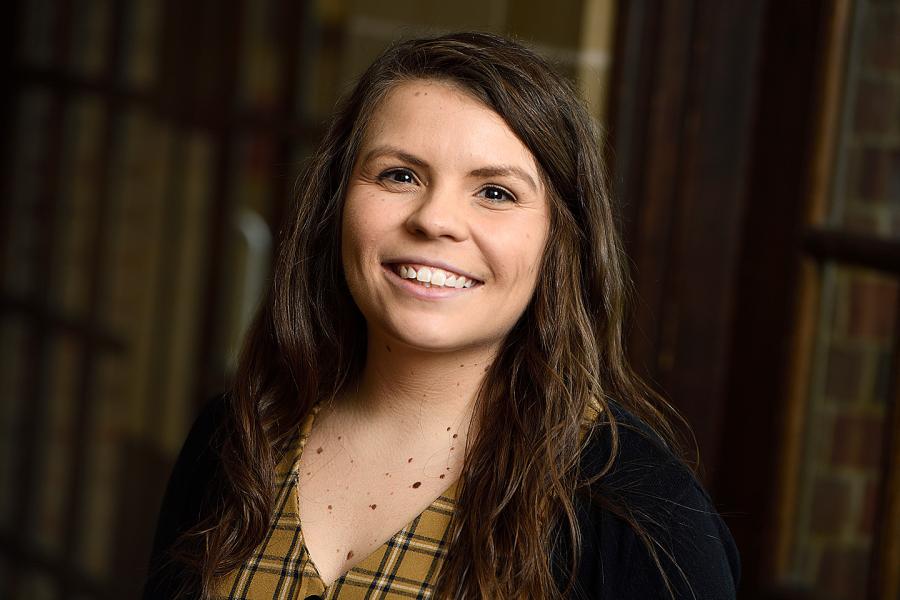Chrissy St Clair, an avid exerciser, believes it's just as important to give her brain as good a workout as she does the rest of her body. "Your brain is another muscle, and you have to exercise it," says St Clair, who attends 45-minute cardio/resistance training sessions almost every morning. "I've always had this love for learning—so I constantly try to flex my brain muscles to absorb new information."
This is why she's going back to school. St Clair, manager of student benefits at Johns Hopkins, immediately decided to fulfill a longtime goal and seek a master's degree upon learning about the university's enhanced tuition benefit introduced this fall. "I want to grow and advance in my career and have a stronger foundation of human resources principles," she says. "It will be very beneficial to have this educational building block."
The new tuition benefit, which applies only to those seeking degrees, raises the annual amount for undergraduate degrees, both associate and bachelor's, to $5,250 from $2,000, and to $10,000 from $5,250 for graduate degrees. JHU employees can use the benefits at any accredited institution, including those outside JHU.
The new enhanced benefit became available for the fall semester, and all full-time employees are eligible 120 days from their hire date. Eligible expenses include tuition and course-related fees. More information about the programs—as well as instructions on how to access the application process—is available on the Benefits & Worklife website.
For non-JHU undergraduate degree programs, the university will pay the school directly, a change that will minimize the upfront out-of-pocket costs formerly borne by employees. Those seeking JHU graduate degrees, once approved, will receive funds directly through their student accounts; those who seek a graduate degree elsewhere will be reimbursed after successfully completing the course.
"There's been an outpouring of interest from our employees about the increased benefit, and we hope the applications will mirror this interest," says Diana Abbott, director of benefits strategy and service at JHU. "We are hearing from more employees who are interested in learning about how the program works. We want to encourage all employees who have thought about pursuing more education to really look at it. It was very important for us to extend the benefit so that our employees are able to pursue further degrees. The graduate benefit is especially meaningful because it really can enhance someone's educational credentials."
St Clair plans to study human resources development at her alma mater, Towson University, with an emphasis on leadership and organization development. It's a two-and-a-half-year program requiring two classes a semester, each meeting one night a week, a schedule compatible with her work and home life, she says. She's newly married and says her husband, a certified public accountant, thinks it's great that she decided to go back to school. "He's really excited for me," she says.
She believes the coursework will "sharpen my skills and make me a better leader at JHU," she says. "It will give me a stronger foundation for the practices I am trying to implement in my day job, and it will provide new knowledge, resources, and principles to use when doing so."
She's excited about her first two courses, which include Group Dynamics and Team Building and Conflict Management and Resolution, saying: "Every job I've had so far has focused on working with groups to get things done and accomplish goals. I think understanding people and their personal motivations will help me as a leader when planning project work. I also don't think that you can ever have enough examples or conversations about how to manage and resolve conflict. We all deal with conflict on a daily basis in our personal and professional lives, and a lot of the skills that I hope to be taught will be able to be applied to all facets of my life."
Instead of writing a thesis, she must complete either a fieldwork experience—she can use her current role at JHU for this—and write a paper describing at least five professional projects that relate to her course content or seek a human resources professional certification. She plans to opt for certification, she says.
St Clair grew up in Damascus, Maryland, and graduated from college with a major in business administration and a concentration in marketing. Initially, she planned on seeking a marketing research career, inspired by the movie Daddy Day Care. In it, the character played by Eddie Murphy holds a corporate job and runs focus groups. "I thought that's what I wanted to do," she says. "Then I realized that the entryway was through digital marketing, which didn't interest me at all because I thought it lacked interacting with people. There was too much focus on ad revenue and sales—and didn't feel good at all."
As an undergrad, she participated in a Towson-sponsored hiring event where she was offered a 10-week internship with a third-party benefits administrator, and that led to a job offer from the company after graduation. "I completely fell in love with employee benefits," she says. "That sealed the deal, and I've been in it ever since." In October 2021, she joined JHU, where she manages medical, dental, and vision benefits for undergraduate and graduate students, and postdoctoral fellows—anyone eligible for a student plan.
She loves her work because it provides "the real people touch," she says. "I can take complex and confusing subject matter and explain it in simple terms that people can understand, how to use benefits, where to find providers and go for care." She adds, laughing: "When my friends and I started working in adult jobs, I became their go-to person to help them decide on plans and coverage. I became their custom benefits consultant."
She's enthusiastic about returning to the classroom, especially to a familiar academic setting. "Because I went to Towson for my undergrad degree, I am comfortable with the campus, finding classrooms, parking, nearby places to grab a quick dinner before class," she says. "I won't have those new-school jitters that can add anxiety when exploring something new."
She views this opportunity as a joyful counterpoint to the three recent years permeated by COVID-19.
"I want to look back at this post-pandemic period and feel like I used the time wisely," she says. "As an Enneagram type 8—the challenger, I greatly enjoy taking on new challenges, often feeling rejuvenated when I master a new skill," she adds, referring to her score on the personality test. "Taking on grad school while working full time, maintaining an active social calendar, hitting up early morning workouts five or six days a week, and spending quality time with my husband, Pat, will be a challenge. But with my can-do attitude, steady inner drive, and initiative to make things happen, I am looking forward to this new chapter of life."
She urges other JHU employees to do the same: "If anyone is considering taking advantage of this great benefit, I say, Go for it."
Posted in Benefits+Perks
Tagged hr newswire, advancing your career









